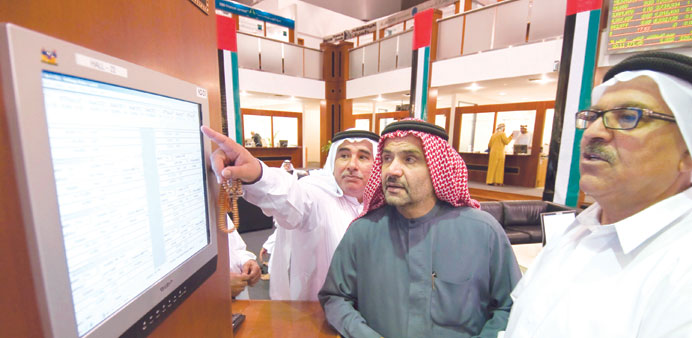Markets in the UAE rose to multi-year highs as investors positioned themselves for first-quarter earnings, while Saudi Arabia’s PetroRabigh plunged after posting a big first-quarter loss and warning about second-quarter earnings.
Meanwhile, the Qatar Exchange’s benchmark index climbed 0.2% yesterday. United Development rose 2.4% after posting a 51% jump in first-quarter net profit and announcing it would liquidate a joint venture with Commercialbank (Qatar).
Industries Qatar, which posted an estimate-beating jump in first-quarter net profit after the market closed, rose 1%.
Dubai’s index advanced 1.4% yesterday to its highest level since December 2009. UAE investors are now focused on quarterly earnings, which begin in earnest this week, said Amer Khan, fund manager at Shuaa Asset Management.
“From a valuation perspective, many UAE stocks are cheaper than the rest of the region so you can see people building some positions,” he said, adding that earnings seen so far in the UAE had been broadly positive.
One of those firms to have already reported, Dubai Islamic Bank, was the session’s biggest mover, jumping 5.9%. Blue chip Emaar Properties, which is expected to report towards the end of this week, rose 1.3%.
In the UAE capital, Abu Dhabi’s benchmark registered its biggest one-day gain in more than two years, climbing 1.8%. The index, which closed at 3,153 points, is at its highest level since November 2009.
Banks helped the advance, as First Gulf Bank broke back above the 15.0 dirhams mark with a 3.8% gain. Abu Dhabi Commercial Bank rose 3.1%; it is due to report first-quarter results on Thursday. National Bank of Abu Dhabi, which will publish earnings today, rose 0.9%.
“The key thing for UAE banks has been the (2012) dividend announcements, as investors have been getting good yields and they also point to a positive earnings outlook,” said Khan.
In Saudi Arabia, PetroRabigh slumped 9.9%, dropping the permitted daily limit, after reporting a big loss in the first quarter due to a major disruption in its supplies of power and steam, and warning that its second-quarter earnings would be hurt by a 12-day shutdown for maintenance at its ethane cracker.
Saudi Telecom, which reported disappointing first-quarter earnings on Sunday, dipped 0.5%.
“Net profit has remained volatile in the past few quarters due to one-off events ranging from revenue from sale of towers to impairment charges relating to subsidiaries,” said Global Investment House in a note, adding that the company’s earnings before interest, tax, depreciation and amortisation (EBITDA) had declined year-on-year for the last two quarters.
However, trading on the Saudi bourse was broadly positive, with the Gulf region’s largest exchange rising 0.4% to 7,124 points - its third successive gain.
Last week the index was pushed down by sliding global oil prices but it tested and held chart support around 7,050 points, which had acted as resistance in early March.
In Kuwait, the measure recovered early-session losses to hit a new 29-month peak. It rose 0.3%, with Zain and Boubyan Bank reversing falls in the previous session with gains of 1.4 and 1.6%.
One positive for the market was news that a Kuwaiti appeals court granted bail to a prominent opposition politician convicted of insulting the ruling emir, which could help to reduce political tensions.
The five-year sentence was not overturned but the court ruled that Musallam al-Barrak should be released on bail of 5,000 dinars ($17,600) and that his defence team would have a chance to argue his case next month, defence lawyer Dokki al-Hasban told Reuters. The case has prompted street protests, some of them resulting in confrontations between police and his supporters.
Egypt’s benchmark declined for the second day this week, slipping 0.7%. Telecom Egypt slumped 8.2% as the stock went ex-dividend; Palm Hills Development dipped 1.8% and Ezz Steel fell 2.2%.
The International Monetary Fund and Egyptian officials said late on Sunday they were working to reach a deal on a proposed $4.8bn loan in “coming weeks”; they cited progress in weekend talks in Washington.
Oman’s benchmark dipped 0.3% as financial stocks continued to weigh; many have reported below-forecast earnings for last quarter. Heavyweight Bank Muscat slipped 0.5% and HSBC Oman dropped 1.5%.
Elsewhere, Bahrain’s index edged down 0.01% to 1,088 points.

